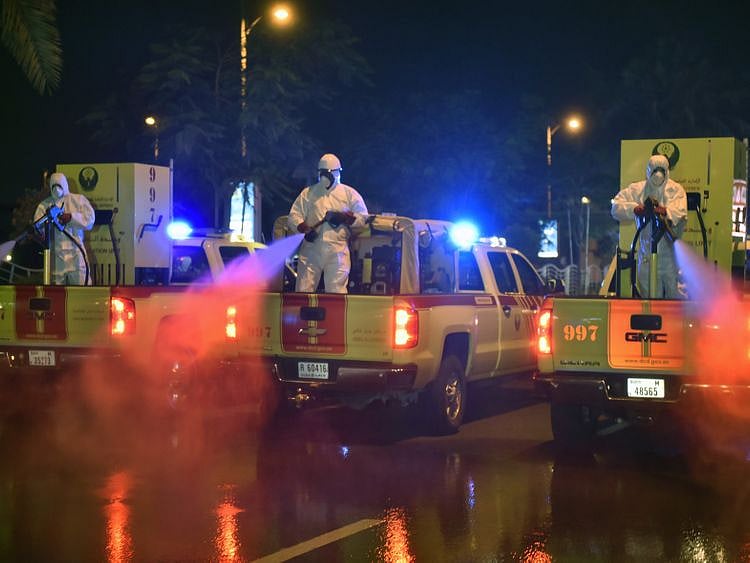Coronavirus UAE: Disinfection efforts will help fight COVID-19
Just as important to practice public hygiene and social distancing, doctor says

Abu Dhabi: As health workers and governments around the world work to slow the spread of COVID-19, the disease caused by the novel coronavirus, large-scale disinfection efforts are becoming commonplace.
Using methods ranging from simple hand-wiping to mobile spray cannons, workers and volunteers are attempting to halt the transfer of the virus by touch. While there are questions about the efficacy of some of the broader spraying tactics, disinfecting frequently-touched surfaces can help stop the spread of the virus, a top public hospital official has said.
One of the most effective ways to fight the spread of the new coronavirus is to disinfect highly touched surfaces.
Across the world, disinfection teams have descended upon kindergartens, state capital buildings, markets, mosques, airports, and public roads.
“The workers are spraying low-concentration bleach-and-water mixtures from trucks, guns, drones, and robots. We have been seeing the same kind of efforts in the UAE, particularly during the weekend-long National Sterilisation initiative,” the doctor said.
“The main question is “how long does the virus stick around in the air or on surfaces?”.. we know that it could stay for a long time, so we have to stick to the protection sanitizing program to clean our cities..” he added
Public-health experts think mass disinfection efforts will have mixed effectiveness in outbreak zones. Disinfecting surfaces that are commonly touched, such as in buildings, houses, shops, centers, hospitals, schools, and religious sites, can help kill germs.
“However, only misting sanitiser in the air or on the street is likely ineffective, because the virus is probably not airborne in large quantities and people don’t touch the street that often. With that being said, the coronavirus can live on surfaces for hours or days so disinfecting frequently-touched surfaces is definitely helpful,” the doctor said.
Scientists aren’t yet sure how long droplets containing the virus can live on surfaces. According to the World Health Organization, “studies suggest that coronaviruses (including preliminary information on the COVID-19 virus) may persist on surfaces for a few hours or up to several days.”
“These efforts help because coronaviruses are enveloped by a fat layer, and disinfectants tear apart this layer,” the doctor explained.
In addition, disinfection does improve the overall sanitation of public spaces, and in turn, generates both social and economic benefits.
Nevertheless, while sanitising buildings and roads is a helpful measure , it is probably not the most effective way to kill the virus everywhere, especially as doing it repeatedly may promote pollution and irritate people’s skin, experts say.
“The coronavirus mainly travels person to person through saliva and mucus droplets, not through tiny particles in the air. So it is integral that we maintain efforts to maintain individual hygiene and practise social distancing,” the doctor stressed.
In addition, people should avoid touching their faces, and stay away from sick people to minimise the risk of transmission.
Sign up for the Daily Briefing
Get the latest news and updates straight to your inbox
Network Links
GN StoreDownload our app
© Al Nisr Publishing LLC 2026. All rights reserved.